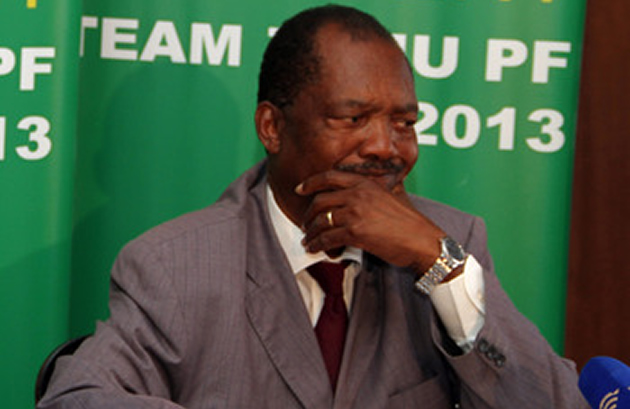Congress: Narratives of Denial

Nathaniel Manheru THE OTHER SIDE
I love Gabriel Garcia Marquez. He is late, that Nobel laureate from Columbia who passed on this year, just a day before our National Day.
I have drawn from his writings, a point my loyal readers would vouch for.
He believed in words, and used them to batter the world he did not like, buttress and bolster the value he cherished. Anecdotes, clever ones too, were his principal entry into reading and laying down a larger precept of life, or for decrying its misdemeanours.
As in the following illustrative anecdote which he used to stress the contradictory importance of words to life. At twelve, Gabriel says he almost got run down by a bicycle.
He was saved by a shout from a passing priest: “watch out”! The cyclist fell to the ground.
And before hurrying on, the priest turned to Marquez and said: “Now do you see the power of the word?” Recalling and writing about this incident on April 7, 1997 (April and Gabriel!), he concluded: “That day I found out.” Which is probably why he became a journalist, poet and essayist, all of them darned through words.
Routed silence
From that reckoning, he would later write: “Humanity will enter the third millennium under the sway of words. It isn’t true that the image is displacing them or can annihilate them.
On the contrary, it is empowering them: there have never been so many words in the world with so much scope, authority, and violation as in the immense Babel of life today.
Words invented, mistreated, or sanctified by the press, by throw-away books, by advertising posters: spoken and sung on the radio, on television, in films, on the phone, on loudspeakers, shouted with a broad brush on the walls of buildings or whispered in the ear in the penumbra of love.
No, what has been routed is silence.” I could go on quoting from that beautiful piece, and still gladden my readers so used to vigorous prose. Marquez is my man.
A genre called journalism
Congress in here. So are the hacks. Of all hues and temperament. It is a hubbub, possibly our second fame, we for so long injured by routed silence, by too much publicity.
The Civic Square, now renamed Robert Gabriel Mugabe Square, has been the venue.
Not just for Zanu-PF actors, more accurately gladiators, but for those hacks so given to descending on matter like vultures of the veld.
One is never sure: are those vultures invited by stench, or do they fly in with it, itself as an intrinsic, delineating aroma of their profession?
Maybe Marquez knows, and once less coy, may speak to us from his grave. But they are here, the hacks, as usual studiously foolish, no abatement.
And always looking clever and clairvoyant, these un-annointed seers. Sorry, I had forgotten. In fact Marquez gave us his answer in 1996, two years shy of as many decades before his demise, so we could profit from it. Typically, he started with an anecdote relating to what he termed “a Columbian university”.
Asked what journalism was, the university gave a categorical answer: “Journalists are not artists”. Of course the cantankerous Marquez thought otherwise, stressing journalism was “a literary genre”, adding it informed much less, formed more often.
Losing the basic tools
Amazing how such a simple construction silences a profession so given to beckoning to itself through pitched yodels.
And as a former journalist, he lamented, wondering why a profession of his first love now looked so “disconnected from reality and its vital problems”.
Practitioners came to it with “flagrant deficiencies”, seemingly solely motivated by a criminal propensity for an infraction of its ethics, infractions seemingly justified by obedience to, and fulfilment of, an “audacious notion of the job”, namely “sanctification of being first at any cost and above all else”.
He added: “Some graduates are not moved by the basic principle that the superior news article isn’t always the first one turned in but is often the best one”.
Apart from poor academic grounding, he blamed it all on new, dizzying technologies in newsrooms, technologies which have displaced journalism’s three most essential and dependable aids or tools: a notebook, unswerving ethics, and two ears for listening doubly.
He didn’t like a tape recorder, and would have smashed it on sight: “The tape recorder hears but doesn’t listen, it repeats – like a digital parrot — but doesn’t think, is faithful but has no heart and, in the long run, its literal version will not be as trustworthy as that of somebody who pays attention to the living words of his interlocutor, evaluates them with his intelligence, and assesses them with his morality”.
Cue to minders and keepers
I have done enough tribute to Marquez, done it on behalf of Zimbabwe, a country he might not have even known, still less cared about. The other day I had an embittered graduate journalist in my office. Why, she asked, are my editors always exhorting me to turn in a hard news story for the front page?
Don’t they see and know the tone of news has changed, know that all hard news are soft or softened nowadays. Looking at her with gushing pity, I said: don’t be daft.
Go back to your college days and recall the classroom difference between a hard and a soft story. The one requires eyes, faculties to unerringly witness physical action; the other requires a mind, a watching mind that processes abstract notions that go towards news analysis well, after physical action has been projected and reported on.
I gave an example of the President’s recent address to commanders and veterans, distinguishing between that occurrence as a hard, physical event, and that development as a commentary on relations within the governing executive, stressing how the media had concentrated exclusively on the occurrence as a hard event, in the process leaving readers the poorer.
Of course a conceptual media, one able to handle soft copy, would have realised the President was sending a clear cue to founders of this Nation, and to keepers of the State which his deputy minds when he is away.
When a Head of State and Government does that, the message should be very clear, trimming many of the questions which now seem impertinent, while still lingering, thanks to our blind media.
She mourned with sudden recognition, promising to be a little more tolerant of her conceptually challenged superiors.
Where little road names dwarf events
I advert to the Zimbabwe Independent, a paper I take seriously, but always to repeated disappointment. And this week was no exception.
One of its big guns devoted attention of the little roads – all of them too short, too symbolic even to deserve notice — at the new Robert Mugabe Square.
Four columns, one half page, all for that! And the key accusation was that these little “roads” had been declared without the knowledge or authority of the City Fathers! On that Square where everything looks so temporary, where everything looks like a model or prototype city awaiting actual construction?
So this one hack is exercised about these “streets”, all of them named after Zimbabweans; he is not worried about real roads and highways named after cut-throat colonialists which abound in our cities and towns, roads and avenues singing immortal praises to these conquerors.
To the road, to the name, they were all named well before the city fathers he claims have been sidelined where born! Where they consulted? And if they know the significance of naming, as the paper seems to suggest, why have they not tackled that long outstanding one?
And the Zimbabwe Independent, a paper named after our Independence, why has it not written about it? By all this focus on the venue of deep, reshaping politics of the future! Names of little, temporary roads, that is what is most significant!
The elective Congress they once craved for
Then you have my dear Muckraker obsessing about Rugare Gumbo, as if he is a self-appointed keeper. And the whole piece amounts to a stubborn rejection of facts of history, facts which keep bouncing against a mind that would not learn.
I will leave Muleya’s column alone, refocusing on the weekly’ front-page story, “Economy biggest loser at Congress”.
To give the piece a veneer of scientific grounding, figures are reeled, figures of company closures and lost jobs.
Well and good, until one realises these closures were underway, by the paper’s own admission, from 2011, when it was high noon for the Inclusive Government.
No one, least of all the Zimbabwe Independent, lamented that the shutting down economy was the biggest loser of that inclusive governing congress! Quite the contrary the inclusive arrangement was plumed as the panacea which did not have to end.
But the three days of Zanu-PF congress are blamed for those closures, or are supposed to cure them.
Here is one paper which until recently has been most enthusiastic about the “elective” Congress suddenly going coy about the same, and in ways reminiscent of its intemperate editorials in the run-up to the 2013 elections! It gets worse when one remembers the same paper has been urging for a speedy resolution of the succession issue for the sake of stabilising the economy.
Should journalism make political choices? And retreat from those choices when they falter, retreating so baldly, with such senseless bitterness?
Beneath the Darwinian ladder
But the Zimbabwe Independent is about local politics. I am more interested in those hacks who flew in for the same story, the David Smiths and Masekos of their world. To them add dead-hacks-once-upon-a-time-come-back-to-life-again like Jan Raath. Welcome back Jan!
For them this is a story of binaries, simplistic binaries at that. It is about two factions; it is about two fighting women; it is about an old president pitted against inexorable time.
For them, the line of symmetry is that clear, clean and straight, with all falling either/or! I suppose that is how African societies appear in the eyes of hacks of Victorian mould and tradition.
There is nothing complex about pre-scientific, pre-industrial, savage African societies all inhabiting regions at the bottom level of the Darwinian ladder. The promptings of the African mind are singular: power and how to keep it forever.
Nothing else.
Activists always, reported sometimes
Can someone tell me why people have to fly all the way from South Africa, Nairobi, London and Paris, to come to discover the Joice/Grace conflict, to write about the Mujuru/Mnangagwa factions, to claim a Mugabe dynasty, etc, etc?
Surely that can be done from the Internet? What value does flying in add to such a familiarly stupid and tired script? You don’t need to fly in, or get accredited to insultingly write about “Gucci Grace”, “DisGrace” or “First Shopper”, surely?
Or to be kept in the country for that, so you can hurl those epithets from the comfort of Harare. Or to be here to report that Robert Mugabe, a man you have reported as enfeebled by advanced time, has suddenly regained enough strength to “tighten grip” on power.
Still less to retreat from a cemetery of drunks the Jan Raath-style, to call Professor Moyo “Ping-pong Jonathan”, as you have renamed him before.
Are these not the “flagrant deficiencies” in hacks which Marquez was writing about?
Is this not the kind of output unavailingly set to come from people who are activists always, journalists sometimes? Indeed output guaranteed from brains without filter?
A comment from a rival suitor
You cannot miss the senselessness of it all.
These stories are driven on sources outside Zanu-PF, sources from the opposition or renegades: Simba Makoni, Ibbotson Joseph (Mandaza), Rugare Gumbo. What opinion do you hope to get from a rival suitor?
You bring Obert Gutu to talk about a Zanu-PF congress? What does he know beyond reflexive oppositional castigation?
The British Guardian went a step further. It opened up to Vince Musewe, a self-confessed serial MDC-T activist-columnist, but without warning its readers.
His partisan view passes for a well canvassed, representative opinion. And views from this skewed discourse went without even the most basic of interrogations.
David Smith of the Guardian quotes Rugare Gumbo charging: “The way things are happening, it’s hard not to conclude that there is an amount of dictatorship, there is an amount of tyranny, there is an amount of authoritarianism . . . If you’re going to appoint your vice-president, that smacks of authoritarianism in this age when people should be elected. To me, it doesn’t make sense . . . Mugabe said he wants to rule forever. We said no, it’s not right, it’s not democratic. It’s not right that you hold a congress with unelected people. For some of us, that’s unacceptable.”
Marquez’s hated recorder
Unless you are Marquez’s tape recorder which hears but does not listen, which repeats but does not think, which is faithful but does not have a heart, why would you not ask your interlocutor how old that “tyranny” he so abhors has been, given that he was its haughty spokesperson hardly three weeks ago, its member hardly two days ago? In that capacity he even declared he was the only speaker of the tyrannical party!
Unless you are the same tape recorder, why would you not wonder with this thorough-bred democrat, this tenacious believer in the elective ethic, why he has agreed in the past to hold public positions both in Government and in the party, without winning a single election, and doing so without giving us “an amount of dictatorship, an amount of tyranny, an amount of authoritarianism”, whatever all that means in everyday political science. Where those not appointments, a waiving of the electoral ethic he now sorely misses? Unless you are a perfect epitome of Marquez’s digital recorder, why would you let pass the assertion that appointing a Vice President amounts to dictatorship?
Did it not happen with the current holder of the post in the Party? Did it not happen with the current holder in respect of the same portfolio in Government? Much more, unless compelled by an unhappy result, it does not happen in Britain where Smith comes from! Is Britain a tyranny by that fact? And interestingly, Gumbo’s assertion that Mugabe wants to rule forever betrays the target of his political and alleged conspiratorial action, does it not?
Clearly he is opposing Mugabe’s tenure, never the manner by which Mugabe identifies his deputy. But this a mere fifteen or so months into a national elective tenure? Why is election by bearers of delegated power seemingly more critical to democracy than a national plebiscite?
When turncoats are cleansed
Which takes me to the larger points I want to make this week. Firstly, in the media ideological sympathies, constructions or legitimation work through a willing suspension of disbelief or scepticism, through a questioning line wilfully foregone. Senselessness buttressing a preferred line is condoned, allowed to pass or even edified, in order that a preferred thought gains currency and diffusion.
Gumbo is not making sense; but he is tolerated, propped and even moored by an ideologically grateful Smith. A combination of Smith’s ideological bias and knowledge of British interests on Zimbabwe tells him when not to bite. When not even to bark. These powerful factors tell him to wag his tail romantically around Gumbo’s groin and navel, while ferociously baring his fangs against Gumbo’s perceived enemies. So Gumbo becomes “Mugabe’s key ally” in order to exacerbate the fallout or perceptions of a fallout from which Smith’s country profits.
So Gumbo becomes a veteran fighter for freedom to underline the depth of Mugabe’s “treachery”, Mugabe’s desertion from ideals of the struggle which are now reposed in Gumbo, a Zanu turncoat in 1979/80.
Journalism as a smokescreen
Secondly, journalism must create a smokescreen which hides the real interests at play. The whole Congress has been framed as a fight between factions who trim to two personalities: Mujuru and Mnangagwa. Or as a fight between two women: Grace Mugabe and Joice Mujuru. The act of hooking the conflict on two sets of local personalities creates an illusion of a local and localised conflict, does it not?
That way the Western hand is hidden and excused from charges of meddling. Much more, the same hand is cleansed to play umpire in a game in which it has no visible interest. And if the white/western factor is out of it all, the stereotypes around African politics can kick in, kick in with no qualifications.
With such invisibility, what amounts to a real setback of the West becomes a tragedy for a local, losing politician, another instance of ruthlessness for the winning one!
Signifiers in deeper drama
But the two ladies are signifiers in a deeper drama. The hate emotion contrived through claims of excesses and names given to Grace Mugabe is meant to mobilise Zimbabweans against the direction of political change the West does not approve of, mobilise Zimbabweans for the direction of change the West wishes for us in the country, but while making this look like a local choice and concern, a local preference, a local triumph or setback. So Grace Mugabe must be stopped politically because she is profligate and waspish with her mouth, a point which Smith makes with a little bit of assistance from Ibbo Joseph.
The impulse of pity and victimhood cultivated and courted for Joice Mujuru is meant to mobilise Zimbabweans against the politics associated with Mai Mugabe, to mobilise Zimbabweans for a moderate post-Mugabe political dispensation personified in Amai Mujuru. They key thing is not just to go beyond the two women; it is to unpack the politics they represent and to know which forces these competing politics please or displease. This line of probing, the West does not want or encourage among natives, which is why Congress debate needs a visceral wrap-up, needs unthinking binaries, needs a smokescreen.
The names Mnangagwa, Mujuru and Grace Mugabe have become ideological tags and shorthands to pre-empt a proper local understanding of what is at stake. They have become designations of false actors in a western narrative of obfuscating denial.
Enter Tendi’s demonisation thesis
And my next point will please Dr Miles-Tendi. What the accrediting Ministry has allowed into the country ostensibly for Congress coverage, are western or western-employed hacks redeploying for a new demonisation assignment, well away from Robert Mugabe who is viewed as outgoing, well within those persons the West regard as prospective actors either in the interregnum, or in the next post-Mugabe dispensation.
Demonisation, it would appear, has become a permanent tool mediating Britain-Zimbabwe relations, even after Mugabe, the person against whom that weapon was developed. Emmerson Mnangagwa and Grace Mugabe stand for a change which the West dreads and abhors; Joice Mujuru, underpinned by Rugare Gumbo and other personalities associated with the struggle, represent a change direction which the West not only prefers, but has been working for, post MDC, post July 31. It has been a long-standing project, one which has had changing and/or vanishing actors, one which has been married and divorced to many other political actors, local and foreign, ruling and oppositional. The collocating scenarios have been very ductile.
But the core has always been the same: British and Western interests, and finding a personality and political regime that best minds them, best promotes them. Everything, Zanu-PF congress included, has been measured and assessed with that one core, that unshakeable interest, in mind, which is why the Congress blew warm and moderate when prospects for the preferred personality were good, and turned into a withering gale when those prospects turned to doom.
The digging hoe she does not need
It pays to know that when imperialism suffers setbacks, especially non-military ones, it re-frames those setbacks as tragedies for local players, as a tragic turn for local politics. We are always the villains, victim and losers, as defeated imperialism floats above the defeat it has suffered, seemingly unscathed, and forever formidable in order to keep the faith. The key thing is to know that the so-called war between factions, between two women, is but the latest deceptive cloak and face to the same old contradiction between a liberation movement and imperialism. Having lost the opportunity provided by national elections in 2013, imperialism hoped for opportunities arising from processes internal to Zanu-PF.
This is why they are using Rugare Gumbo, their political ward from 1979/80 — in fact their key ally, not Mugabe’s — to raise absurd electoral issues which are a matter for a political party, not for the whole Nation of Zimbabwe, let alone the world. They have sought to police national elections, now they want to monitor private party processes!
Mujuru’s fatal error was not her ambition, much as that made her susceptible. It was the white and Western factor incarnated by the landed barons she and her allies hobnobbed with, the western countries whose embassies she feted, often at night and against the dignity of the very State she was asked to hold in an acting capacity. The post-WikiLeaks lull was a false one. The die had been cast. It was only a matter of time.
And she naively and unguardedly used that time to reinforce her culpability, cheered on by a shrill media which would rapidly desert her come crunch time. She needs wisdom, greater wisdom to regain.
Not those crazy scenarios thought viable through Parliament. When you have hit the ground, the last thing you need is a digging hoe. Or those wielding one, employing it in your name. Her non-attendance at Congress was ill-advised, fatal in fact, when assessed within conventional options open to a law-abiding politician she should be.
Icho!











Comments